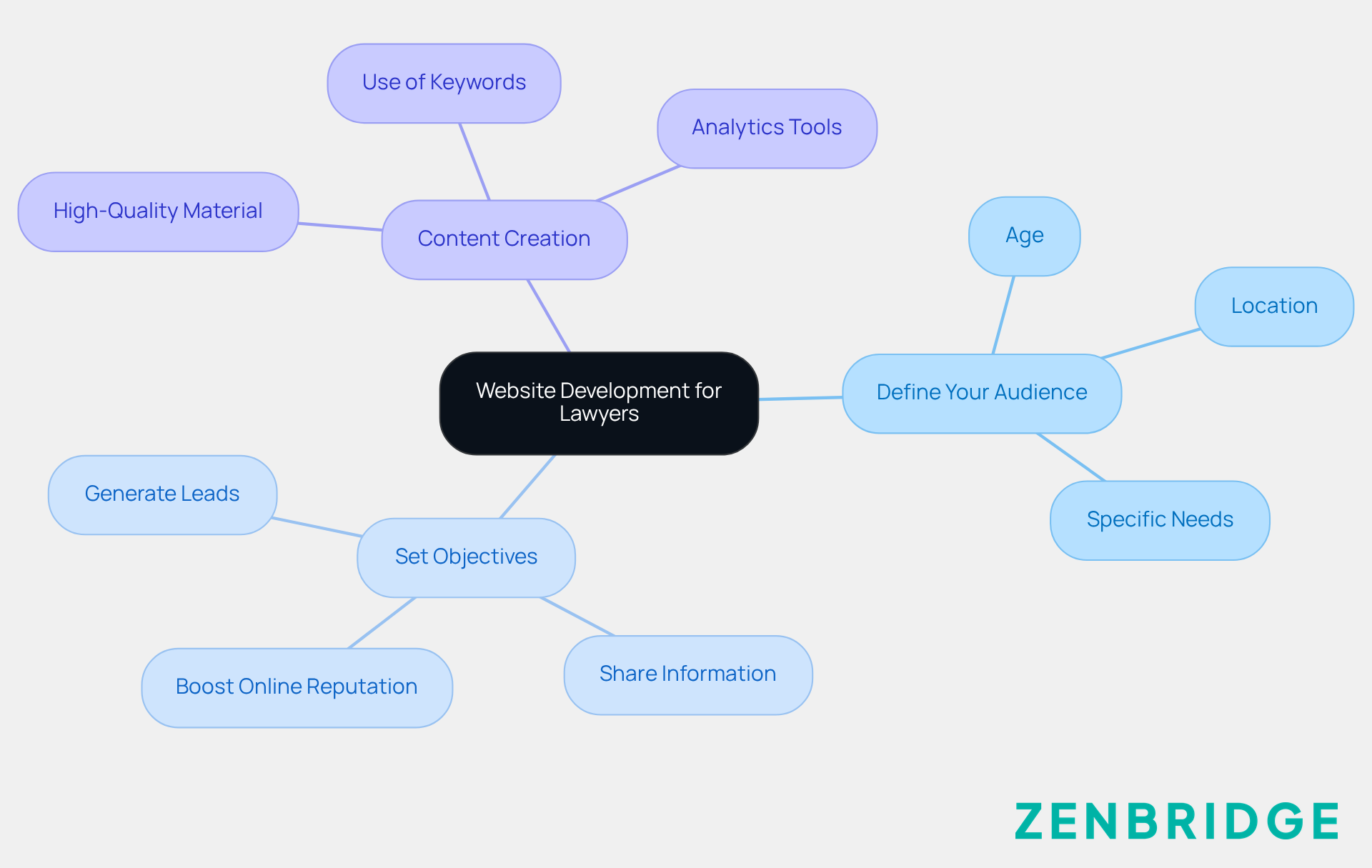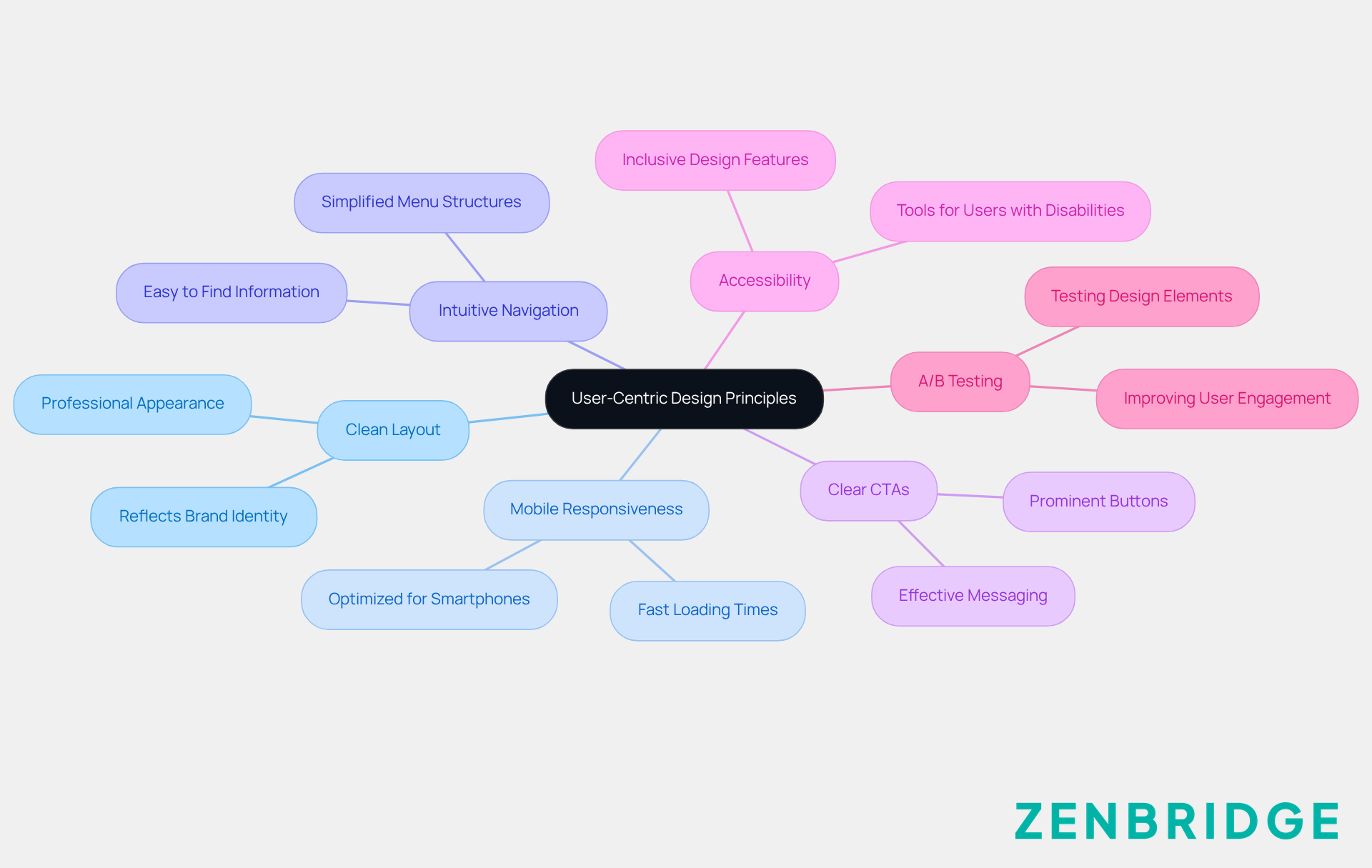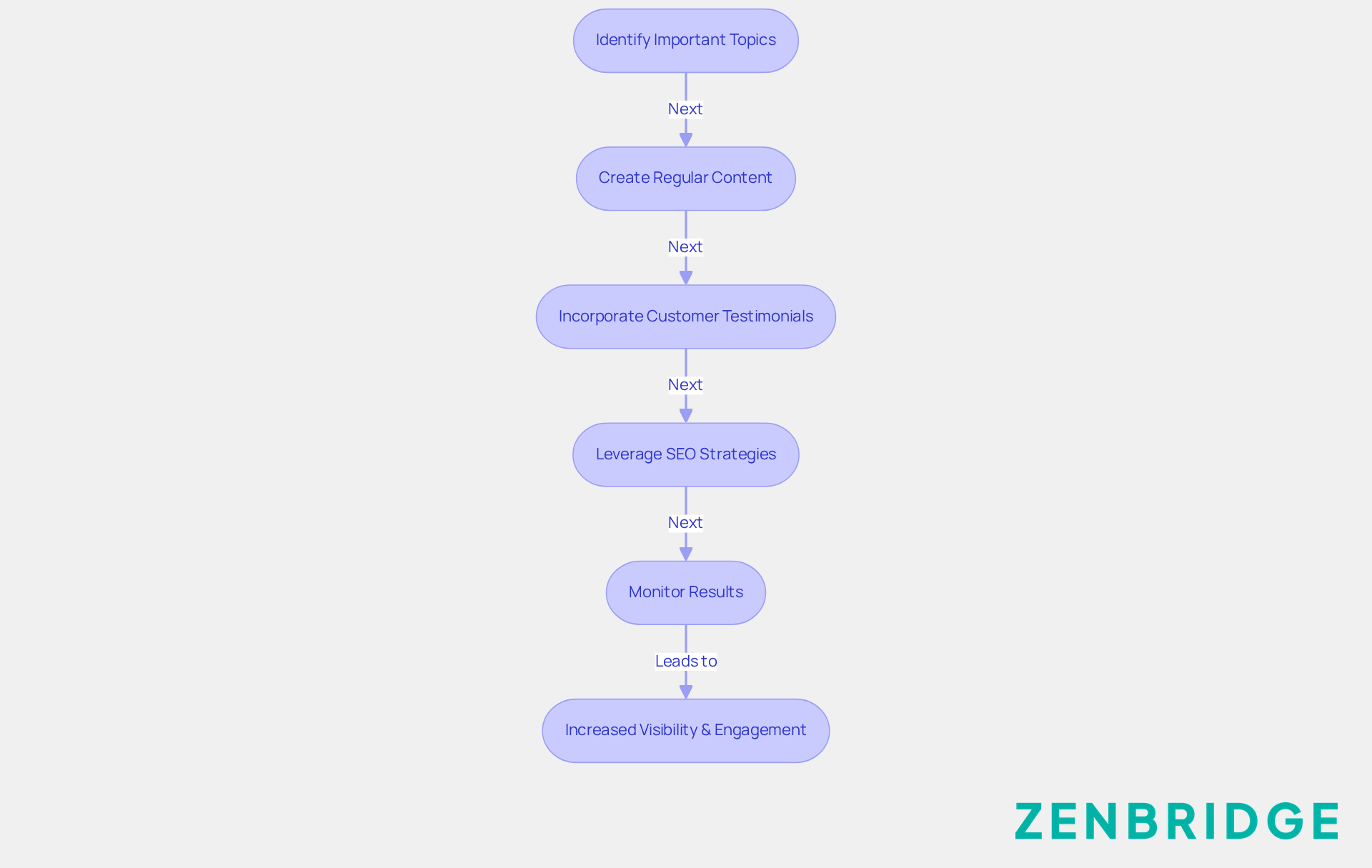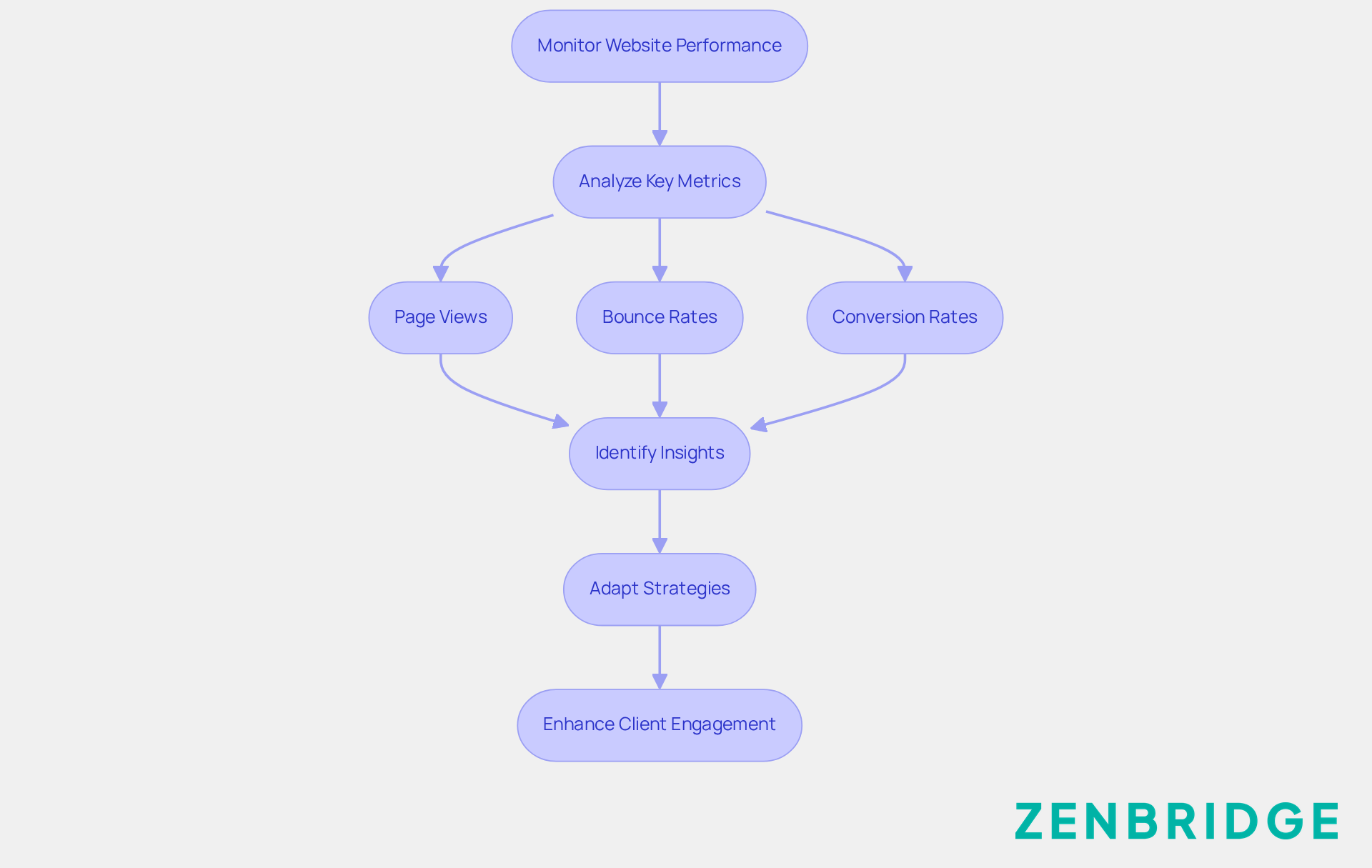
4 Key Strategies for Effective Website Development for Lawyers

Key Highlights:
- Define your target audience by considering demographics and specific legal needs to tailor website content effectively.
- Set clear, measurable objectives for website development, such as increasing consultation requests by 20% in six months.
- Create high-quality content with relevant keywords to attract potential clients and utilise tools like Google Analytics for tracking visitor behaviour.
- Implement user-centric design principles, ensuring a clean layout, mobile responsiveness, intuitive navigation, and accessibility features.
- Develop a strategic content plan that includes blog posts, case studies, and customer testimonials to build authority and trust.
- Utilise AI tools for content management to keep the website fresh and relevant, enhancing lead generation.
- Regularly monitor website performance using analytics tools, focusing on metrics like page views and conversion rates to inform optimization efforts.
- Adapt the website based on user feedback and industry trends to enhance client engagement and satisfaction.
Introduction
Hey there! Effective website development is super important for lawyers looking to build a strong online presence in our digital world. By getting to know their target audience and setting clear goals, legal pros can whip up websites that not only catch the eye of potential clients but also offer valuable info and services. But with so many strategies and best practises out there, how can law firms make sure their websites really stand out and meet their clients' needs?
Let's dive into four key strategies that can take a law firm’s website development to the next level, turning it into a powerful tool for engagement and growth!
Define Your Audience and Objectives
To effectively engage in website development for lawyers, it’s super important to start by clearly defining your target audience. Think about key demographics like age, location, and specific needs. For instance, a family law attorney might focus on folks going through a divorce, while a corporate lawyer may target businesses looking for legal advice.
Once you’ve identified your audience, it’s time to set some clear objectives for the website development for lawyers. Are you looking to generate leads, share valuable info, or boost your online reputation? Setting measurable goals, like increasing consultation requests by 20% in six months, will guide your website development for lawyers design and content strategy.
Now, let’s talk about content. Producing high-quality material with relevant keywords is key for attracting potential clients in website development for lawyers. Plus, using tools like Google Analytics to track visitor behaviour is crucial. Regularly reviewing this data helps you tweak your strategies based on market trends.
This data-driven approach not only enhances lead generation but also ensures your online presence meets the needs of prospective clients while staying compliant with advertising regulations. So, what do you think? Ready to dive into creating that website?

Implement User-Centric Design Principles
Let’s dive into user-centric design principles! It's all about putting your visitors first—what do they need and prefer? Start with a clean, professional layout that truly reflects your brand identity. And don’t forget, many users will be checking out your site on their smartphones, so make sure it’s mobile-responsive.
Now, intuitive navigation is key. You want your visitors to find what they’re looking for quickly, right? Clear calls-to-action (CTAs) like 'Schedule a Consultation' or 'Contact Us' should pop up prominently on your homepage.
Also, think about accessibility features to ensure everyone can enjoy your site, including those with disabilities. Tools like A/B testing can really help you figure out which design elements resonate best with your audience. This way, you can keep improving and making your site even better!

Develop a Strategic Content Plan
To effectively engage prospective customers, law firms should consider website development for lawyers that includes a strategic content plan offering valuable info tailored to their audience. Start by recognising important topics relevant to your practise areas—like advisory info, case studies, and those commonly asked questions. Consistently releasing blog posts, articles, or videos that tackle common legal issues not only builds your authority but also boosts your SEO. This makes it much easier for potential customers to discover your online presence. You know what? Law firms that utilise website development for lawyers and have a blog often see a noticeable rise in online traffic and lead generation, with 73% of them gaining new customers through their marketing strategies.
Now, let’s talk about how utilising AI tools can really streamline your content management. This way, your website stays fresh and relevant. Including customer testimonials and case studies? That enhances trust and credibility, especially since 78% of legal consumers say that online reviews impact their hiring choices. Plus, don’t forget about leveraging SEO strategies in the context of website development for lawyers. Firms that implement these can enjoy a remarkable 21% increase in organic traffic, leading to a three-year ROI of 526% on SEO investments. By focusing on these strategies, law firms can effectively position themselves as thought leaders in their fields and attract more clients. So, what do you think? Ready to dive in?

Monitor, Optimize, and Adapt Your Website
To keep your law firm’s online presence effective, it’s important to regularly check its performance using analytics tools like Google Analytics or SEMrush. Take a look at key metrics like:
- Page views
- Bounce rates
- Conversion rates
to see how well your online platform is hitting its targets. For example, if a particular blog post is pulling in a lot of traffic, why not think about creating more related content or boosting its promotion?
Now, here’s something to consider: 60% of traffic to legal platforms comes from mobile devices. That means having a mobile-friendly design is crucial for engaging users effectively. As Brent Dykes points out, the art of data storytelling is all about shining a light on key insights that can steer your optimization efforts.
By staying responsive to user feedback and keeping an eye on industry trends, your website can adapt to meet the changing needs and preferences of clients. This approach not only enhances client engagement but also boosts satisfaction. So, what do you think? Ready to dive into your analytics and see what’s working?

Conclusion
When it comes to effective website development for lawyers, it's all about a strategic approach that really gets to know the audience and their needs. By clearly defining who you're trying to reach and setting measurable goals, law firms can create websites that not only draw in potential clients but also cater to their specific legal needs. Plus, focusing on user-friendly design principles makes the site even more effective, ensuring visitors have a smooth and enjoyable experience.
Now, let’s dive into some key strategies. It’s super important to produce high-quality, relevant content that boosts your search engine visibility and positions your law firm as an authority in your field. And don’t forget about analytics tools! They help you keep an eye on how your website is performing, allowing you to adapt your strategies based on user behaviour and industry trends. This data-driven approach keeps your website relevant and ensures it meets the evolving needs of your clients.
Ultimately, the success of your law firm’s online presence hinges on combining these strategies:
- Defining your target audience
- Implementing user-friendly design
- Creating valuable content
- Continuously optimising your site
By embracing these best practises, you can significantly enhance your visibility and client engagement, paving the way for sustained growth in a competitive digital landscape. So here’s the deal: law firms need to take proactive steps to refine their websites, ensuring they not only meet but exceed client expectations in today’s digital age. What do you think? Ready to take your website to the next level?
Frequently Asked Questions
Why is it important to define your target audience in website development for lawyers?
Defining your target audience is crucial because it helps tailor the website to meet the specific needs and demographics of potential clients, ensuring effective engagement.
What factors should be considered when identifying the target audience for a law firm?
Key demographics to consider include age, location, and specific legal needs, such as focusing on individuals going through a divorce for family law attorneys or businesses seeking legal advice for corporate lawyers.
What objectives should be set for website development for lawyers?
Objectives may include generating leads, sharing valuable information, or boosting online reputation. Setting measurable goals, like increasing consultation requests by a certain percentage within a specified time frame, can guide the website's design and content strategy.
How does content quality impact website development for lawyers?
Producing high-quality content with relevant keywords is essential for attracting potential clients and improving search engine visibility, which is vital for effective website development.
Why is it important to use tools like Google Analytics in website development?
Google Analytics helps track visitor behaviour, allowing for regular reviews of data to adjust strategies based on market trends, which enhances lead generation and ensures the website meets client needs.
How does a data-driven approach benefit website development for lawyers?
A data-driven approach enhances lead generation and ensures that the online presence aligns with the needs of prospective clients while remaining compliant with advertising regulations.

